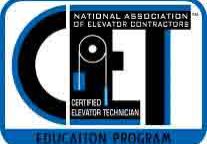Defining the term certification, and a look at the necessity for certification of elevator inspectors
With the American Society of Mechanical Engineers (ASME)’s recent announcement stating it will cease accrediting certifying agencies as of December 31, 2013 (ELEVATOR WORLD, May 2012), many began to doubt the necessity for (and value of) certification of elevator inspectors. Before delving into the need for certification, let us first discuss the differences between certification, licensure and accreditation. While each process involves some type of evaluation and the awarding of some type of credential, they are quite different from each other, and the terms should not be used interchangeably.
Certification can be mandated by law or voluntary. One does not always need to be certified in order to practice a particular profession. An individual typically seeks certification because he or she wants to enjoy the benefits of certification, such as enhancing one’s knowledge and professional status. Certifications are nearly always provided by private, nongovernmental organizations. They are usually offered by entities within associations that create the certification programs. The programs are designed to identify and acknowledge those who have met a specific set of professional qualifications. NAESA International certified elevator inspectors within its organization long before the QEI-I standard was developed and certifying organizations were accredited by ASME.
The standard utilized in any certification process includes requirements for education, practical experience, and an exam of knowledge, skills and abilities essential when an individual is employed in a particular occupation. In the certification of a QEI, the ASME QEI-I Standard for the Qualification of Elevator Inspectors standard is utilized. When an individual meets the benchmarks set forth in the standard, he or she receives a QEI certification from a certifying organization.
Licensure is a non-voluntary process by which a governmental agency regulates a profession. It grants permission to an individual to engage in an occupation if it finds the applicant has attained the degree of competency required to ensure public health, safety and welfare will be reasonably protected. Licensing is always based on the action of a legislative body. Once a licensing law has been passed, it becomes illegal for anyone to engage in that occupation unless he or she has a license.
Accreditation is a nongovernmental process that evaluates institutions, agencies and educational programs, while certification and licensing involves individual practitioners. Accreditation is defined as the process whereby an agency or association grants public recognition to a school, institute, college, university or specialized program of study, such as the program for the certification of elevator inspectors. These associations must meet certain established qualifications or standards as determined through initial and periodic evaluations. These evaluations usually involve submitting a self-evaluation report, site inspection by a team of experts, and evaluation by an independent board or commission. In the past, the QEI-1 standard addressed accreditation of organizations certifying elevator inspectors. This will change with the publication of ASME QEI-1 2013.
The credibility and integrity of the certifying organization determines the public’s perception, and, therefore, the value of the certification bestowed upon individuals by that organization. Accordingly, certifying organizations may seek recognition by an outside agency that will, in turn, attest the certifying organization meets a specific standard. Generally, this standard involves the qualification requirements to take the exam, whether the exam meets accepted psychometric standards for exam development, how the exam is given and scored, how the organization is administered, and whether the organization’s rules are fair. Recognition is generally awarded in the form of accreditation.
The proposed QEI-1 2013 standard will eradicate nearly all of the existing Part IV, thereby eliminating the requirement for accredited organizations to subscribe to a particular benchmark. In addition, this change will effectively place the responsibilities for the certified inspector and accredited organizations under two separate entities. In lieu of accreditation per QEI-1, certifying organizations must now explore other avenues to achieve their accreditations. In an ideal world, the certifying organizations would acquire their accreditations from an entity that subscribes to a uniform standard for certification, thereby ensuring the accredited organizations adhere to the same benchmark.
NAESA is currently seeking accreditation to the ISO/IEC 17024 Standard with the American National Standards Institute (EW, July 2012). ISO/IEC 17024 was developed with the objective of achieving and promoting a globally accepted benchmark for organizations wishing to certify individuals. Certification of persons is one means of providing assurance that the certified person meets the requirements of the certification structure. Confidence in the respective certification systems is achieved by means of a globally accepted process of assessment, subsequent surveillance and periodic reassessments of certified persons’ competence. ISO/IEC 17024 should be considered the basis for recognition of certifying organizations and their certification programs in order to facilitate their acceptance at the national and international levels.
In today’s economy, new technology is introduced at a rapid rate, quite often resulting in inconsistency in education and training. The development of certification systems for persons, in response to the ever-increasing development of technological innovation and growing specialization of personnel, may compensate for disparities in education and training and, thus, facilitate the global job market.
Certification holds different values for each party involved. For the certifying organizations, certification provides a standardized practice within the industry, thereby providing a means for the inspection field to self regulate. QEI-1 mandates which standards and procedures are to be followed by certified inspectors, while ISO/IEC 17024 specifies requirements that ensure certifying organizations are operating in a consistent, comparable and reliable manner. Both documents provide requirements to establish and enforce an ethical code.
For elevator inspectors, certification provides recognition by an unbiased third party, thereby enhancing the credibility and professional reputation of the certified inspector. Certification demonstrates the certified individual supports continued professional development, shows a high level of commitment to the elevator industry and has attained and maintains a certain level of knowledge and skill. Each of these qualities potentially increases opportunities for career advancement and increased earnings. Certification may also assist individuals with meeting employer or governmental requirements, thereby providing a broader field for potential employment.
Certification can provide professional development opportunities for employees through ongoing enhancement of knowledge and skills, thereby demonstrating the employer’s commitment to competence. In some instances, employing certified individuals provides compliance with industry regulation or government requirements. The public also benefits, since certification assists in identifying qualified service providers and increasing their confidence in these providers.
Certified inspectors have a personal obligation to be ethical and honest in the pursuit of their profession. Each inspector must keep current with the latest changes in codes and inspection practices. No inspector should take his or her job lightly, since thousands of people are dependent on the scrutiny provided by periodic inspections.
The value of certification covers a broad spectrum. Employers, industry personnel and building owners should believe an individual’s certification demonstrates competence to perform inspections with the utmost professionalism and due diligence. Certification of inspectors must continue if the industry is to be viewed with integrity and the willingness to provide for the safe operation of elevators and escalators.
Get more of Elevator World. Sign up for our free e-newsletter.







